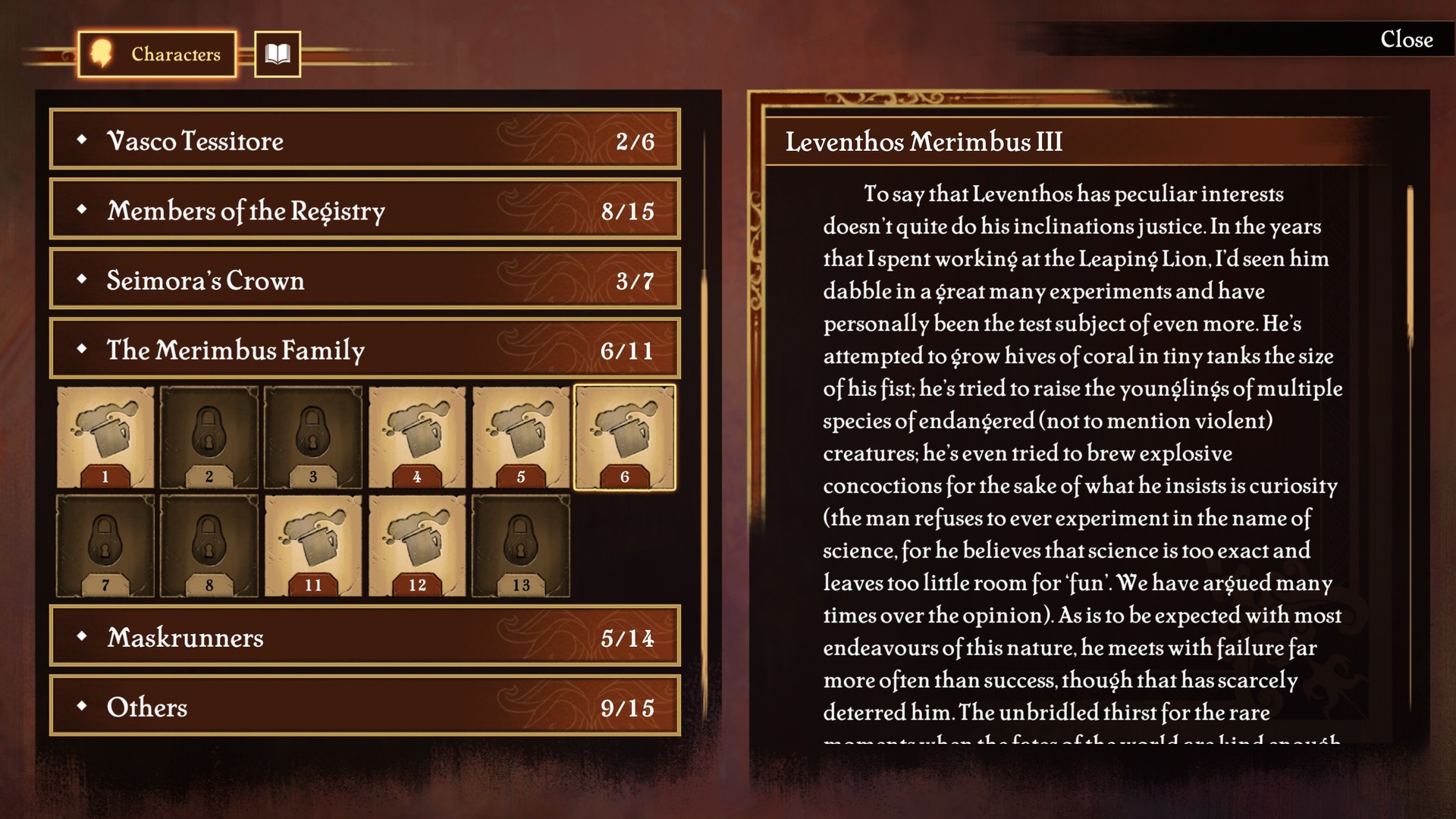Molto bene
Masquerada: Songs and Shadows feels spiritually similar to a Final Fantasy game, in some key ways.
Its got a deep world-mythos, for one. Not unlike your Espers or your Mako, the setting of Masquerada is steeped in an original mythology which shapes the game's characters and events; and the protagonists discover dramatic truths about that mythology as the story proceeds.
The game has an introductory problem, with an overload of mytho-babble about mascherines and Contadani and The Registry and other buzzwords that haven't been explained yet. But the pieces come together after the first hour or so, and as the plot's central mystery takes off, that initial sense of confusion turns into a hunger to learn more about this magical world.
Through a handy Mass Effect-style in-game codex, lore-nerds like myself can spend a large chunk of playtime reading background exposition and well-written, in-character anecdotes.

Something Masquerada does really well - and which I'd call hit-or-miss in Square Enix's games - is humanizing its characters, creating compelling bridges between the player and this unfamiliar world. It doesn't just use class struggle as a narrative theme, it moulds character personalities around their troubled upbringings; while there are political events that drive the story, those events and their consequences are rooted in personal motives and emotions.
It helps that the game's writing and voice acting are stellar. A lot of "gameplay" time (maybe even most of it) is spent in conversation, and little of that time feels wasted, but it's also not overly pragmatic or rushed. Masquerada's spoken dialog delivers pathos without being melodramatic, which is impressive for any game production.
That being said, I'd stop short of calling the story itself a masterpiece -- while it's told well, the greater mythology plot can be somewhat dry, and some points remain conspicuously unexplained (or at least unfinished) in the end. The game's resolution fulfilled my interest in its characters, but not so much in its fantasy world.
Another way in which Masquerada reminds me of Final Fantasy is its combat: not because of mechanical similarities, but because while Masqerada's tactical action is somewhat deep and intricate, it is so easy that it's handily overshadowed by the game's other elements.
In fact, more-so than in most other RPGs, Masquerada's combat gameplay ultimately feels inconsequential to its entertainment value. I actually really like the mechanical designs of no-experience-points skill upgrades and low-impact equipment options, while I simultaneously disliked how chaotic the battlefield could get (causing problems when trying to click on a specific target); but in the end, it hardly mattered how well or how poorly I did in combat.
Of the small number of times I party-wiped, they were all due to bad positioning and getting flanked by the enemy. So long as I kept my party together and kept clicking my ability buttons, there was never anything to worry about.
When you disregard combat, there isn't much left to Masquerada other than walking through the map toward the next story beat (and optionally collecting lore to read in the pause menu). Which makes it sound like an isometric-3/4-view visual novel ... which isn't entirely off-base.
What else? Well, the music is a mixed bag, with some tracks greatly evocative of "mystery" or "action" but others that are tediously operatic and hymn-like. And animated character portraits do an excellent job of helping characters emote, while the field graphics are just fine, nothing particularly good or bad to note.
Considering that Masquerada's writing and story presentation are far and away the stars of this show, it's remarkable how much work clearly went into other aspects of the game. The map is filled with colorful NPCs and even dynamic physics objects, but NPCs' idle chatter is totally meaningless, and those physics objects have no impact on how you play the game. And though the combat mechanics are super-detailed, those details are practically irrelevant to the outcome.
It makes me feel a little bad for the people who worked on those parts of the game; their admirable design considerations and attention to detail didn't really pay off. But Masquerada was nevertheless a satisfying experience, due to its well-grounded, and well-told, fantasy story.
Better than: Analogue: A Hate Story, CrossCode, Final Fantasy XII
Not as good as: Chrono Trigger, Indivisible
It's awkward to compare it to: other real-time-with-pause RPGs like Baldur's Gate or Dragon Age, because Masquerada's combat is such an insignificant part of the game overall.
Progress: Finished on Normal, got ... most? of the lore pickups.